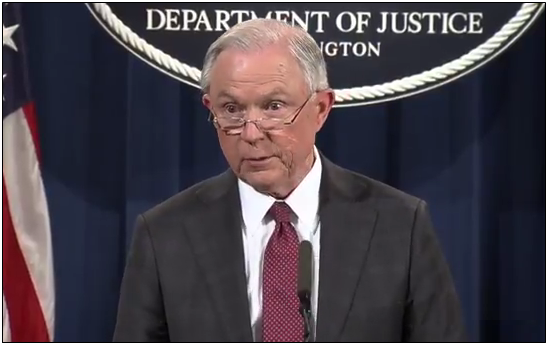Attorney General Jeff Sessions has announced his intention for the Justice Department to no longer defend the Obamacare law’s individual mandate to purchase health insurance in court, in a June 7 letter to House Speaker Paul Ryan.
“In National Federation of Independent Business v. Sebelius [in 2012], a majority of the Supreme Court concluded that this requirement to purchase health insurance could not be sustained as a valid exercise of Congress’ power under the Commerce Clause,” Sessions explained in the letter.
But, Sessions added, “A different majority nonetheless upheld the constitutionality of Section 5000A(a) under Congress’s taxing power… On December 22, 2017, the Jobs Act amended Section 5000A(c) by eliminating (effective in 2019) the penalty imposed for noncompliance with Section 5000A(a)… [but] did not, however, amend 5000A(a) itself.”
And now, a coalition of 20 states is suing the federal government, on the basis that without the tax, the individual mandate—and thus the Obamacare law—is and remains an unconstitutional exercise of Congress’ Commerce Clause powers.
Sessions and the Justice Department will no longer be defending the case in court—which could very well be another nail in the coffin for Obamacare.
Americans for Limited Government President Rick Manning issued a statement praising Sessions for upholding in his eyes Chief Justice John Roberts’ ruling on Obamacare finding the individual mandate to own health insurance violates the Commerce Clause of the Constitution.
Manning stated, “Attorney General Jeff Sessions took an extremely bold step in deciding not to defend what remains of the Obamacare law. When Congress eliminated the individual mandate tax penalty by zeroing it out, the tax of which was cited as the primary rationale of the constitutionality of Obamacare by Chief Justice John Roberts in his majority opinion, the fundamental constitutional underpinning of the law was removed.”
As far severability goes, Sessions stated that besides guaranteed issue and community rating — which the Obama administration had argued would be inseverable from the individual mandate — the Justice Department would still argue the rest of law would be severable from the individual mandate.
That is not particularly great news for those who would rather see the entire law struck down in toto, but there it is. Although there were four justices who were ready to find the entire law unconstitutional because the law had no severability clause, that is not what he court’s majority concluded. And, sadly, that is not what the Justice Department will be arguing.
Per Sessions, “Outside of these two provisions of the ACA, the Department will continue to argue that Section 5000A(a) is severable from the remaining provisions of the ACA.”
Make no mistake, the Justice Department is still bolstering the states’ court case by conceding that without the tax, the individual mandate is an unconstitutional violation of the Commerce Clause. That’s half the battle.
The states suing against the federal government will undoubtedly also argue that the rest of the law is inseverable from the individual mandate, and that if the individual mandate goes, so must the rest of the law — but that’s where the fight will be. They might win, but then again, they still might lose that part of the court case.
That is why, Manning said, Congress still has work to do, stating, “Congress should take this opportunity to enact legislation that pulls the Affordable Care Act out by its roots and replaces it with sound, constitutional policy that respects free markets, individual choice and state prerogatives.”
Because at the end of the day, while it is nice to wish that the Supreme Court will rescue us from the consequences of elections when there’s a law we don’t like, we shouldn’t count on that outcome. If we want the law repealed in full, then Congress must still act.
Robert Romano is the Vice President of Public Policy at Americans for Limited Government.








